FOUR ARGUMENTS FOR UNIVERSAL SOCIAL PROTECTION FLOORS TO ACHIEVE THE RIGHT TO SOCIAL SECURITY FOR ALL
Action contre la Faim & Development Pathways
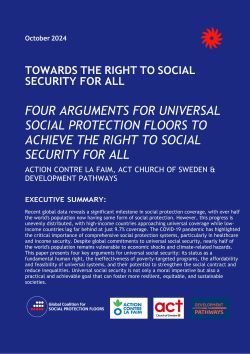 |
Recent global data reveals a significant milestone in social protection coverage, with over half the world's population now having some form of social protection. However, this progress is unevenly distributed, with high-income countries approaching universal coverage while low income countries lag far behind at just 9.7% coverage. The COVID-19 pandemic has highlighted the critical importance of comprehensive social protection systems, particularly in healthcare and income security. Despite global commitments to universal social security, nearly half of the world's population remains vulnerable to economic shocks and climate-related hazards. This paper presents four key arguments for universal social security: its status as a fundamental human right, the ineffectiveness of poverty-targeted programs, the affordability and feasibility of universal systems, and their potential to strengthen the social contract and reduce inequalities. Universal social security is not only a moral imperative but also a practical and achievable goal that can foster more resilient, equitable, and sustainable societies.
Download pdf
THE IMPACT OF FOREIGN DEBT AND HARSH AUSTERITY ON ARGENTINA'S SOCIAL PROTECTION SYSTEM
Centro de Estudios Legales y Sociales (CELS)
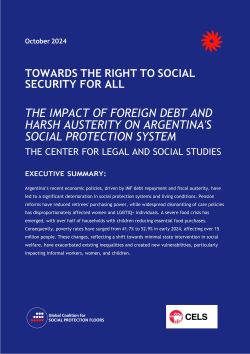 |
Argentina’s recent economic policies, driven by IMF debt repayment and fiscal austerity, have led to a significant deterioration in social protection systems and living conditions. Pension reforms have reduced retirees' purchasing power, while widespread dismantling of care policies has disproportionately affected women and LGBTIQ+ individuals. A severe food crisis has emerged, with over half of households with children reducing essential food purchases.
Consequently, poverty rates have surged from 41.7% to 52.9% in early 2024, affecting over 15 million people. These changes, reflecting a shift towards minimal state intervention in social welfare, have exacerbated existing inequalities and created new vulnerabilities, particularly impacting informal workers, women, and children.
Download pdf
THE SOCIAL CARD REGISTRY: ENTRENCHING POVERTY AND DISCRIMINATION
Amnesty International
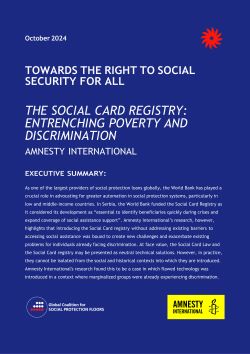 |
As one of the largest providers of social protection loans globally, the World Bank has played a crucial role in advocating for greater automation in social protection systems, particularly in low and middle-income countries. In Serbia, the World Bank funded the Social Card Registry as it considered its development as “essential to identify beneficiaries quickly during crises and expand coverage of social assistance support”. Amnesty International’s research, however, highlights that introducing the Social Card registry without addressing existing barriers to accessing social assistance was bound to create new challenges and exacerbate existing problems for individuals already facing discrimination. At face value, the Social Card Law and the Social Card registry may be presented as neutral technical solutions. However, in practice, they cannot be isolated from the social and historical contexts into which they are introduced.
Amnesty International's research found this to be a case in which flawed technology was introduced in a context where marginalized groups were already experiencing discrimination.
Download pdf
TARGETED SOCIAL PROTECTION DURING UNPRECEDENTED ECONOMIC CRISIS: CASE OF SRI LANKA
Colombo Urban Lab & Feminist Collective for Economic Justice
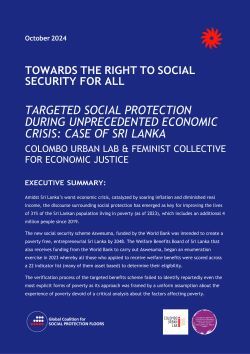 |
Amidst Sri Lanka’s worst economic crisis, catalyzed by soaring inflation and diminished real income, the discourse surrounding social protection has emerged as key for improving the lives of 31% of the Sri Lankan population living in poverty (as of 2023), which includes an additional 4 million people since 2019.
The new social security scheme Aswesuma, funded by the World Bank was intended to create a poverty free, entrepreneurial Sri Lanka by 2048. The Welfare Benefits Board of Sri Lanka that also receives funding from the World Bank to carry out Aswesuma, began an enumeration exercise in 2023 whereby all those who applied to receive welfare benefits were scored across a 22 indicator list (many of them asset based) to determine their eligibility.
The verification process of the targeted benefits scheme failed to identify reportedly even the most explicit forms of poverty as its approach was framed by a uniform assumption about the experience of poverty devoid of a critical analysis about the factors affecting poverty.
Download pdf
RIGHTS VS. AUSTERITY: THE BATTLE FOR DECENT UNIVERSAL BASIC INCOME IN SOUTH AFRICA
Institute for Economic Justice & Social Policy Initiative
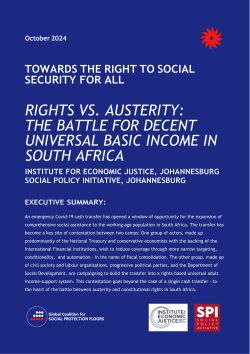 |
An emergency Covid-19 cash transfer has opened a window of opportunity for the expansion of comprehensive social assistance to the working age population in South Africa. The transfer has become a key site of contestation between two camps: One group of actors, made up predominantly of the National Treasury and conservative economists with the backing of the International Financial Institutions, wish to reduce coverage through more narrow targeting, conditionality, and automation - in the name of fiscal consolidation. The other group, made up of civil society and labour organisations, progressive political parties, and the Department of Social Development, are campaigning to build the transfer into a rights-based universal adult income-support system. This contestation goes beyond the case of a single cash transfer - to the heart of the battle between austerity and constitutional rights in South Africa.
Download pdf